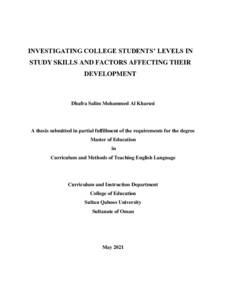وثيقة
Investigating college students' levels in study skills and factors affecting their development.
عناوين أخرى
دراسة مستوى المهارات الدراسية والعوامل المؤثرة فيها لدى طلبة المرحلة الجامعية
الناشر
Sultan Qaboos University.
ميلادي
2021
اللغة
الأنجليزية
الموضوع
الملخص الإنجليزي
This study investigated the level of study skills as perceived by students and teachers in a
private college in Oman. It also studied the difference in study skills levels based on
gender, specialization, and year of study in college. In addition, the study explored the
factors that affected students' use of study skills. Students' perceptions were collected
from 512 participants using an adapted version of self-report pretested study skills scale
by Denis Congo's (2011). The scale consisted of seven sub-categories that measured
reading, note-taking, memory, test-preparation, concentration, time management, and
critical and creative thinking. Moreover, a validated questionnaire developed by the
researcher was used to measure the effect of three types of factors on students' study
skills, namely the personal factors, the family, school related factors, and college-related
factors. Data from the scale and the questionnaire were treated quantitatively using the
SPSS statistics. Means and standard deviations were used to interpret students' study
skills levels. Additionally, the differences in study skills between the genders were
analyzed using t-test. One-way ANOVA was used to study the differences in students'
levels of study skills based on specialization and year of study in college. The teachers'
perceptions were collected using semi-structured interviews, and were analyzed
qualitatively through grouping similar ideas and comparing the teachers' responses.
Findings from the study revealed a moderate level of study skills as perceived by the
participating students. Amongst all participants, time-management skills and reading
skills received the lowest scores. Teachers, on the other hand, thought that students did
not demonstrate an adequate level of these skills and they perceived them to be 'poor'.
The two skills that the teachers highlighted to be the poorest were time-management
skills and note-taking. The t-test showed a significant difference between females and
males favoring the latter. Male students outscored in reading, concentration, time management, and critical and creative thinking skills. Based on the One-way ANOVA
analysis of differences among specialization, a significant difference was observed
between Humanities and IT students' use of study skills, favoring Humanities students in
several skill areas, including reading, test-preparation, time-management, concentration,
and note-taking. Overall, students' specialization explained 29.3% of the variance in
students' study skills levels. Similarly, the One-way ANOVA results for students'
differences in study skills levels based on the year of study in college showed some
significant variance in all the study skills areas except for time-management. In most of
the cases, year 5 students significantly outscored their peers in year 1.
Finally, results related to the factors affecting students' study skills levels showed that the
personal factors contributed the most in shaping students' study skills. Of all the personal
factors, the item covering the aspiration to achieve excellence and obtaining good marks
achieved the highest mean score. Implications and suggestions were made, and
recommendation for future research in the subject area were provided for interested
researchers.
المجموعة
URL المصدر
الملخص العربي
هدفت هذه الدراسة إلى بحث مستوى المهارات الدراسية للطلبة في إحدى الكليات الخاصة في عمان من خلال قياس تصورات الطلبة عن مدى ممارستهم لمهارات القراءة وتدوين والمالحظات ومهارات الحفظ والتركيز والأستعداد لإلختبارات ومهارات إدارة الوقت ومهارات التفكيرالنقدي والأبداعي، وكذلك دراسة تقييم المعلمين لمستوى تواجد هذه المهارات لدى طلبة الكلية. كما هدفت الدراسة إلى معرفة ما إذا كانت هناك فروق ذات دلالة إحصائية في مستوى المهارات الدراسية بين الطالب بناء على متغيرات الجنس والتخصص وسنة الدراسة في الكلية. إضافة إلى ذلك، بحثت الدراسة في مدى تأثير بعض العوامل المتعلقة بالفرد والعائلة والمدرسة والكلية في التأثير على المهارات الدراسية للطالب. تكونت عينة الدراسة العشوائية من 215 طالبا وطالبة: منهم 111 من الأناث 501 من الذكور. كما ضمت العينة ٨ من أعضاء من الهيئة التدريسية من مختلف الأقسام الأكاديمية بالكلية. تم استخدام ثالث أدوات لإلجابة على أسئلة الدراسة، شملت مقياس دينيس كونجو١١٢٢ لقياس المهارات الدراسية، واستبانة استهدفت دراسة العوامل المؤثرة على المهارات الدراسية، والمقابالت مع أعضاء الهيئة التدريسية. وأظهرت نتائج التحليل الأحصائي للبيانات وجود مستوى متوسط في المهارات الدراسية لدى الطالب بشكل عام، مع وجود تدني في مهارة القراءة ونقاط قوة في مهارات الحفظ بحسب تصورات كال من الطلبة والمعلمين. بالأضافة إلى ذلك، فقد أشارت النتائج لوجود فروق ذات دلالة إحصائية في المستوى الكلي للمهارات الدراسية بين الجنسين لصالح الذكور، السيما في مهارات القراءة والتركيز وإدارة الوقت والتفكير النقدي والأبداعي. كما وجدت فروق ذات دلالة إحصائية على مستوى متغير التخصص الدراسي لصالح مجموعة الدراسات الأنسانية ،وعلى مستوى السنة الدراسية لصالح طالب السنة الخامسة باستثناء مهارة إدارة الوقت التي لم تسجل فروق ذات دلالة إحصائية بناء على متغير السنة الدراسي. أخيًرا، أظهرت النتائج المتعلقة بالعوامل التي تؤثر على مستويات مهارات الدراسة لدى الطالب أن العوامل المرتبطة بالفرد ساهمت بشكل أكبر في تشكيل المهارات الدراسية لدى الطلبة، وكان التطلع إلى تحقيق التميز والحصول على عالمات جيدة الأعلى تأثيرا لتبني مهارات دراسية فعالة من بين جميع العوامل الأخرى وفي ضوء النتائج الحالية توصي الباحثة بالأهتمام بمستوى أعلى بتقديم برامج تدريبية في المهارات الدراسية وتعزيز وجود الأهداف المرتبطة بها في المناهج الدراسية. كما توصي بإجراء المزيد من البحوث مستقبال السيما لبحث مبررات وجود فوارق في المهارات الدراسية بين طالب التخصصات المختلفة.
قالب العنصر
الرسائل والأطروحات الجامعية

